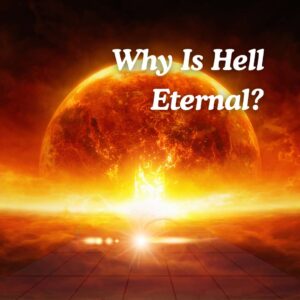 The concept of hell as an eternal reality is a deeply challenging one, both theologically and emotionally. In Catholic teaching, hell is understood as a permanent state of separation from God, and its eternity reflects the gravity of rejecting divine love and grace. This article explores why hell is considered eternal from a Catholic perspective, using insights from Scripture and Church teachings to illuminate this profound doctrine.
The concept of hell as an eternal reality is a deeply challenging one, both theologically and emotionally. In Catholic teaching, hell is understood as a permanent state of separation from God, and its eternity reflects the gravity of rejecting divine love and grace. This article explores why hell is considered eternal from a Catholic perspective, using insights from Scripture and Church teachings to illuminate this profound doctrine.
The Nature of God’s Justice
Central to understanding the eternity of hell is the nature of God’s justice. In Catholic theology, God’s justice is perfect and is intimately connected with His infinite goodness. The Catechism of the Catholic Church explains that God respects human freedom even in the context of eternal consequences. As stated in Catechism #1035:
“The teaching of the Church affirms the existence of hell and its eternity. Hell’s eternity follows from the divine justice which is itself eternal.”
God’s justice ensures that the consequences of human choices align with His infinite goodness. Hell’s eternity reflects the unchangeable nature of divine justice and the reality of eternal separation from God for those who freely choose to reject Him.
Free Will and Eternal Choices
The concept of free will is crucial in understanding why hell is eternal. God grants human beings the freedom to choose their destiny, and this freedom allows individuals to accept or reject divine grace. In Deuteronomy 30:19 (WEBBE), God says:
“I call heaven and earth to witness against you today, that I have set before you life and death, the blessing and the curse. Therefore choose life, that you may live, you and your descendants.”
The choice to accept or reject God’s grace has eternal consequences. If one chooses to reject God, that decision leads to eternal separation from Him. The permanence of this choice is a reflection of the profound respect God has for human freedom.
The Permanence of Hell
Scripture depicts hell as a place of eternal separation from God, where the consequences of sin are irreversible. In Matthew 25:46 (WEBBE), Jesus describes the final judgment:
“These shall go away into eternal punishment, but the righteous into eternal life.”
This verse emphasizes the eternity of both heaven and hell. Just as the life of the righteous is eternal, so too is the punishment for those who reject God. This parallel reinforces the permanence of hell in the context of eternal rewards and consequences.
The Unchangeability of God’s Decrees
In Catholic teaching, hell’s eternity is also tied to the unchangeability of God’s decrees. Once a soul has made a definitive choice to reject God, that decision is unalterable. In Hebrews 6:4-6 (WEBBE), it is stated:
“For it is impossible that those who were once enlightened and tasted of the heavenly gift, and were made partakers of the Holy Spirit, and tasted the good word of God, and the powers of the age to come, and then fell away, should be renewed again to repentance; seeing they crucify to themselves the Son of God afresh, and put him to an open shame.”
This passage reflects the difficulty of repentance after having definitively rejected God. The inability to be renewed again to repentance underscores the permanence of one’s final choice and, by extension, the eternal nature of hell.
The Nature of Sin and Its Consequences
The severity and eternal nature of hell can be better understood by examining the nature of sin and its consequences. Mortal sin, in Catholic teaching, is a grave violation of God’s law that, if unrepented, leads to eternal separation from God. As stated in Revelation 21:8 (WEBBE):
“But for the cowardly, unbelieving, abominable, murderers, sexually immoral, and sorcerers, and idolaters, and all liars, their part is in the lake which burns with fire and brimstone, which is the second death.”
This passage portrays hell as a place of fiery torment, emphasizing its eternal nature. The depiction of the “second death” highlights the irrevocability of the punishment for those who persist in sin without repentance.
The Concept of Final Perseverance
Catholic teaching holds that the final state of a soul is determined by its last choices and its perseverance in faith. In Luke 16:26 (WEBBE), Jesus recounts the parable of the rich man and Lazarus:
“Besides all this, between us and you there is a great gulf fixed, that those who want to pass from here to you may not be able, and that none may cross over from there to us.”
This parable illustrates the fixed and irreversible nature of the afterlife, reflecting the eternal separation between the saved and the damned. The “great gulf” signifies the permanence of the final state after death.
The Absence of Redemption After Death
The idea of eternal hell is also connected to the absence of redemption after death. In Catholic belief, the opportunity for repentance and conversion ends at death. This is supported by the teaching of the Church that purgatory is a temporary state for purification, not a place for eternal punishment. Once a soul has passed from this life, its eternal destiny is sealed. In 2 Corinthians 6:2 (WEBBE), Paul writes:
“For he says, ‘At an acceptable time I listened to you, and in a day of salvation I helped you.’ Behold, now is the acceptable time. Behold, now is the day of salvation.”
The emphasis on the present moment as the time for salvation reinforces the finality of one’s choices in this life. The opportunity to seek God’s mercy must be seized during earthly life, as the final state after death is unchangeable.
Theological Reflection on Eternal Punishment
The eternal nature of hell is a complex and sobering doctrine that invites deep theological reflection. The Catholic Church teaches that the eternity of hell is not a contradiction to God’s love but rather a reflection of the seriousness of human freedom and the consequences of rejecting divine grace. As C.S. Lewis famously wrote, “There are only two kinds of people in the end: those who say to God, ‘Thy will be done,’ and those to whom God says, in the end, ‘Thy will be done.’”
This choice highlights the respect that God has for human freedom, even when it results in eternal separation. Hell, therefore, is a testament to the profound respect God has for our free will and the ultimate seriousness of our choices.
Conclusion: The Call to Embrace God’s Mercy
The doctrine of eternal hell challenges us to reflect deeply on the nature of divine justice, the permanence of our choices, and the gravity of sin. From a Catholic perspective, the eternity of hell underscores the infinite respect God has for human freedom and the serious consequences of rejecting His love and grace.
In light of this teaching, the Church calls all to embrace God’s mercy and live in accordance with His will. The promise of salvation remains open to all who seek it sincerely. As 2 Peter 3:9 (WEBBE) affirms:
“The Lord is not slow concerning his promise, as some count slowness; but is patient toward us, not wishing that any should perish, but that all should come to repentance.”
God’s mercy is boundless, and the Church’s teachings on hell serve as a solemn reminder of the importance of responding to God’s call with repentance and faith, ensuring that our final destiny is one of eternal joy with Him in heaven, rather than eternal separation in hell.
You may also want to read the book “What Should You Look Forward To In Heaven?”
